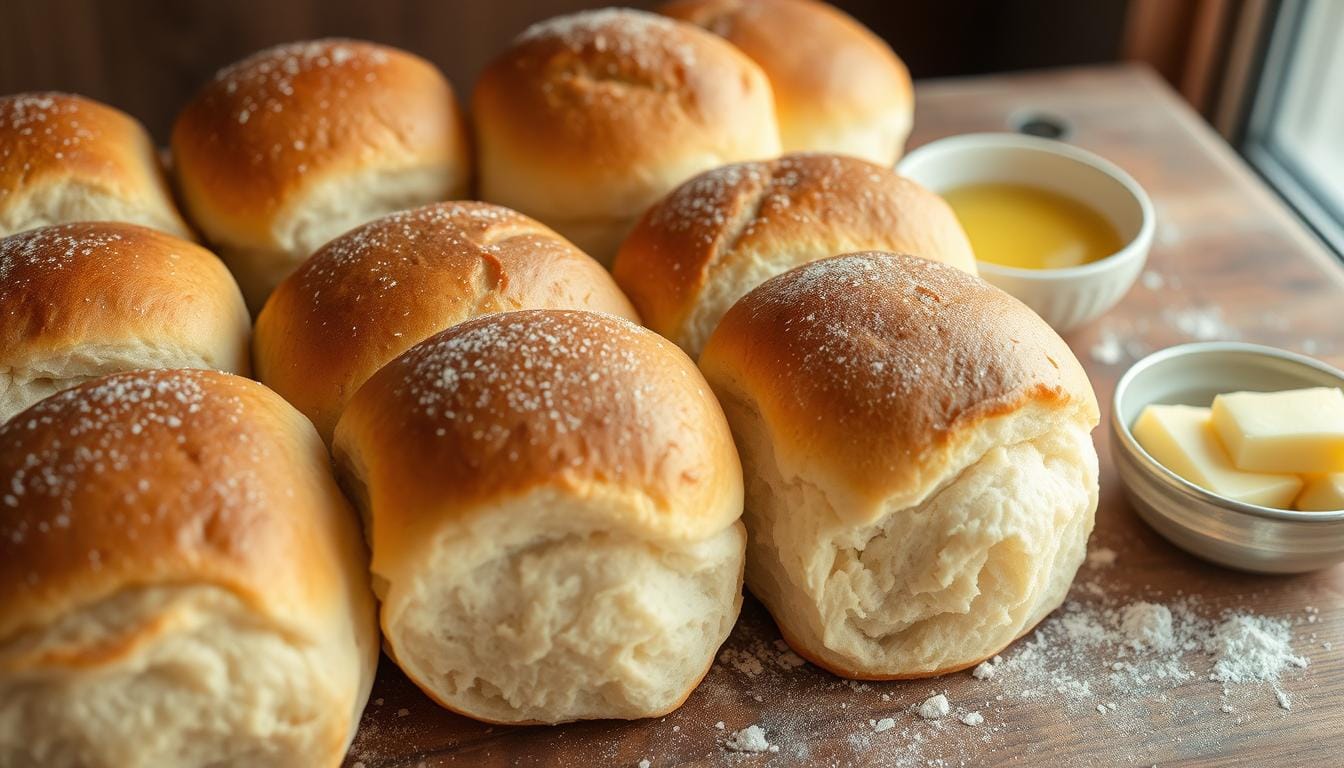Easy Sourdough Rolls: Perfect for Beginners
Ever stood in your kitchen, smelling fresh bread and remembering family times? Baking can seem scary, especially with sourdough. But, easy sourdough rolls are simple for beginners and super rewarding. You just need a few things like a sourdough starter, warm water, and flour.
Picture pulling warm, golden rolls from the oven. The steam rises as you open one, showing its soft inside. These rolls can make any meal special. The fermentation process, which takes 8 to 24 hours, makes the flavor richer and the texture amazing. You don’t have to be a pro to enjoy baking sourdough. With a little patience and practice, it becomes a fun way to express yourself in the kitchen.
Table of Contents
Introduction to Sourdough Baking
Sourdough baking is a mix of tradition and skill. It may seem hard at first, but it’s worth it. Unlike quick bread, sourdough uses slow fermentation and natural yeast, which takes time.
This baking method has been around for centuries. It connects you to a long history every time you bake a loaf.
The heart of sourdough is a live culture called a sourdough starter. You need to feed it flour and water regularly. This keeps it alive and active for your bread.
Getting good at baking means learning about this starter. Many find it easier to mix all ingredients together at once. This makes it simpler to enjoy sourdough recipes.
As you get better, you’ll learn about things like temperature and time. For example, the bulk rise stage can take anywhere from three to twelve hours. This depends on your room’s temperature and the starter’s strength.
Practicing the stretch and fold technique during this stage can really help. With over 13 years of baking experience, you can learn from others. They share their knowledge through blogs and cookbooks that make sourdough easier.
Mastering sourdough baking is a rewarding journey. It turns simple ingredients into a tasty, airy bread. Start with simple recipes to dive into this world. You’ll find the rewards are as good as the bread itself.
Benefits of Easy Sourdough Rolls
Easy sourdough rolls are a hit among home bakers. They have a soft and fluffy texture that’s perfect for any meal. Plus, they’re packed with health benefits.
Soft and Fluffy Texture
The magic of sourdough rolls is their airy feel. The fermentation process makes them light and satisfying. They’re great for dinner gatherings or as sliders.
Health Benefits of Sourdough
Sourdough rolls are good for you. The fermentation process makes nutrients easier to absorb. They’re also easier to digest than regular bread.
Studies show eating sourdough can help you feel full longer. This can lead to healthier eating habits.
Lower Glycemic Index
Sourdough rolls also have a lower glycemic index. This means they help keep blood sugar levels stable. They’re a good choice for those watching their carb intake.
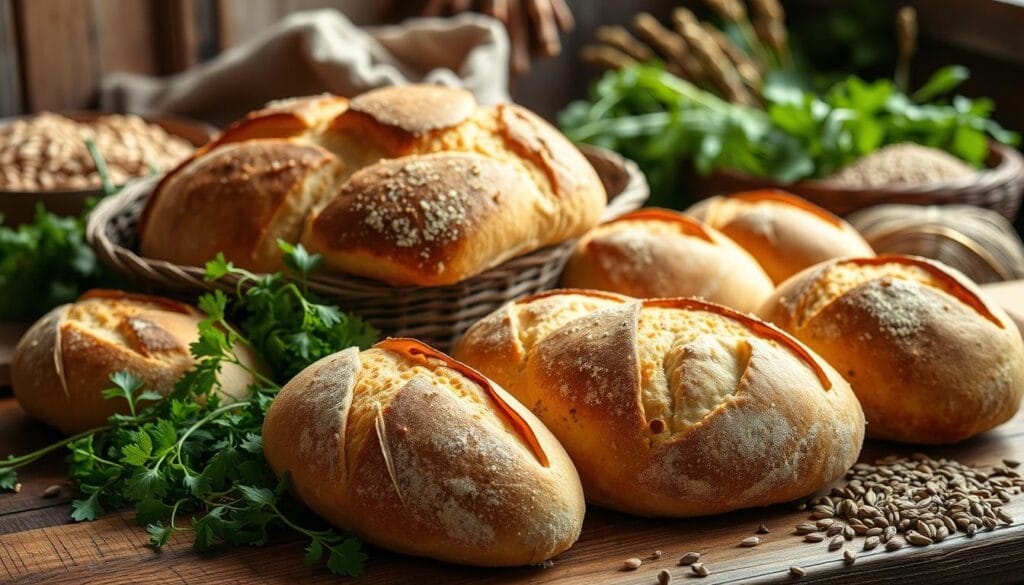
| Nutritional Component | Per 100g Portion |
|---|---|
| Calories | 230 kcals |
| Protein | 7.8g |
| Fat | 0.7g |
| Carbohydrates | 47g |
| Fiber | 2.9g |
| Salt | 0.81g |
Getting Started: Essential Ingredients
Knowing the key ingredients is key to making easy sourdough rolls. Each part is important for the right texture and taste. Let’s dive into these essential ingredients.
Sourdough Starter
A healthy sourdough starter is crucial for your rolls. It gives the yeast needed for fermentation, making your rolls rise well. Make sure your starter is active and bubbly before using it. Use about 7g of starter, 70g of bread flour, and 70g of warm water to make your levain.
This mixture is the base of your dough.
Choosing the Right Flour
The flour you choose affects your rolls’ taste and texture. Use high-quality bread flour for more protein. This helps in making the dough chewy. The recipe needs 450g of bread flour for the perfect rise and light texture.
Other Necessary Ingredients
Along with the starter and flour, other ingredients add to your rolls. For a soft, rich taste, you’ll need:
- 235g of whole milk
- 30g of granulated sugar
- 70g of melted unsalted butter
- 10g of salt
- 25g of cornstarch
Cornstarch makes the rolls tender and keeps them moist. You can try different alternatives, like dairy-free milk or oil. With the right mix, you’ll make delicious easy sourdough rolls.
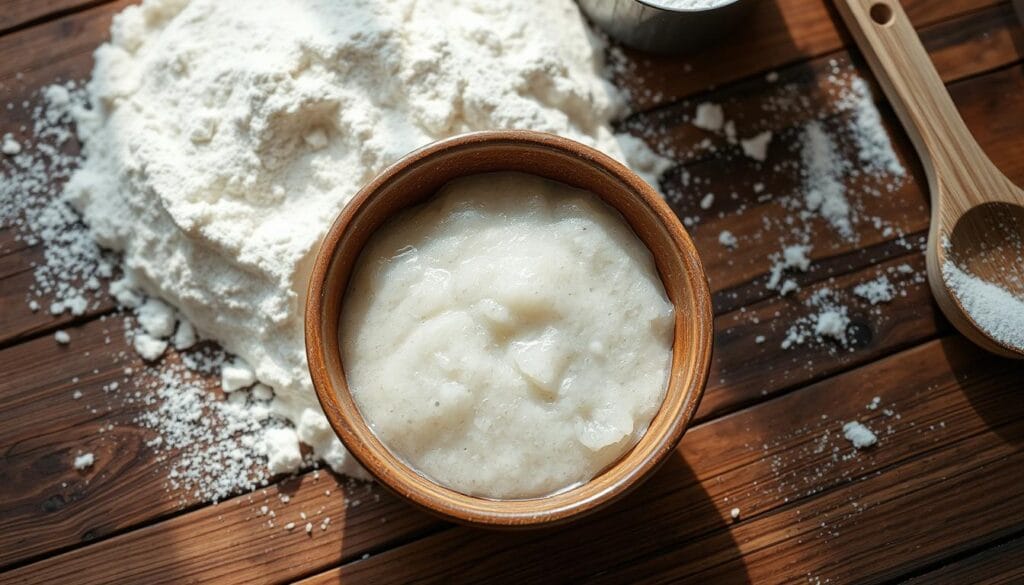
| Ingredient | Amount | Purpose |
|---|---|---|
| Sourdough Starter | 7g | Provides natural yeast for fermentation |
| Bread Flour | 450g | Contributes to structure and rise |
| Whole Milk | 235g | Adds richness and moisture |
| Granulated Sugar | 30g | Sweetens the dough and aids browning |
| Melted Unsalted Butter | 70g | Provides flavor and tenderness |
| Salt | 10g | Enhances flavor and controls yeast activity |
| Cornstarch | 25g | Increases softness and moisture retention |
Basic Sourdough Baking Techniques
Learning the basics of sourdough baking can really improve your results. You’ll learn about kneading and no-knead methods to find what suits you best. Understanding fermentation is key to getting the right taste and texture in your bread.
Kneading vs. No-Knead Methods
Kneading is a key part of traditional bread-making. It involves working the dough to develop gluten, either by hand or with a mixer. This process takes effort and focus.
No-knead sourdough rolls, however, offer a simpler way. The dough rests longer, allowing gluten to develop naturally. For newbies, no-knead is a great, easy way to start.
Understanding Fermentation
Fermentation is crucial in sourdough baking. It boosts flavor and shapes the dough’s structure. There are several fermentation stages to know:
- Bulk Fermentation: This first rise lets the dough grow and become more complex. It should last about 2 hours, depending on the temperature.
- Shaping: After the bulk rise, shaping the dough is important. It helps develop the gluten structure.
- Final Rise: This stage is vital for the dough to puff up before baking.
Knowing when your dough peaks in each stage is key. It ensures your no-knead sourdough rolls are tasty and well-textured. Each fermentation phase greatly impacts your final product.
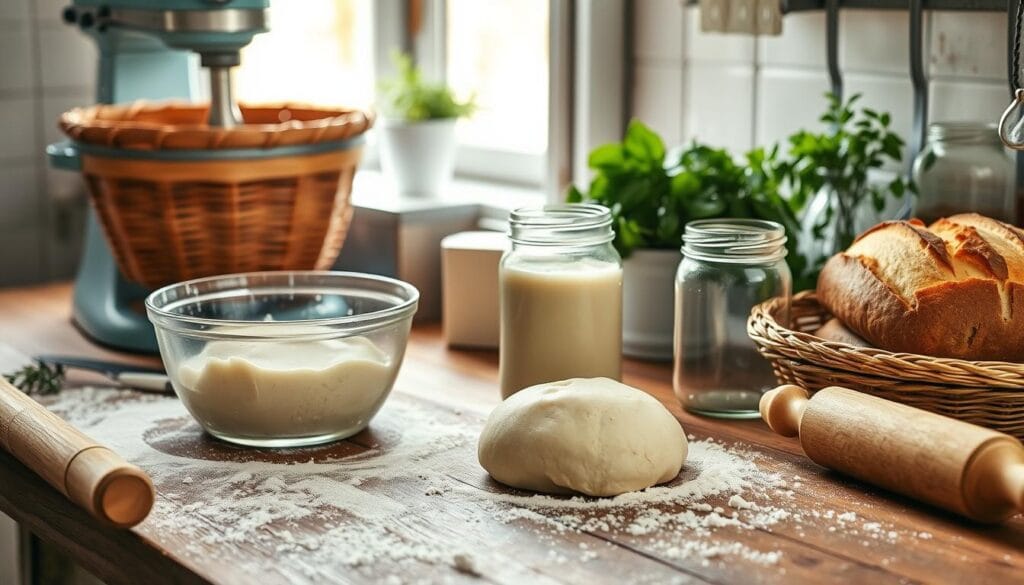
How to Make Easy Sourdough Rolls
Baking easy sourdough rolls is rewarding and simple. You’ll learn how to make easy sourdough rolls with simple steps and timing. Knowing when to let the dough rise is key for the best texture.
Step-by-Step Instructions
To make delicious sourdough rolls, follow these steps:
- Prepare the dough: Mix 335g of warm water, 4g of yeast, and 100g of sourdough starter in a bowl. Add 35g of whole wheat flour, 400g of all-purpose flour, and 11g of kosher salt. Mix until smooth and elastic.
- Bulk fermentation: Let the dough rise for about 4 hours at room temperature. This step enhances flavor and texture.
- Shaping the rolls: Divide the dough into 10 equal pieces and shape each into a roll.
- Final proofing: Let the shaped rolls rise for approximately 2.5 hours. This step is crucial for achieving a light and airy texture.
- Baking: Preheat the oven to 375°F. Bake the rolls for 20-25 minutes until they are golden brown and reach an internal temperature of 190°F.
Timing Your Dough Rises
Timing is crucial for the success of your easy sourdough rolls. The right rise time develops flavor and texture:
| Stage | Rise Time |
|---|---|
| Bulk Fermentation | 4 hours |
| Shaped Rolls | 2.5 hours |
Adjust these times based on your kitchen temperature. Warmer environments may need shorter rises, while cooler places may require more time. Mastering these timing techniques will help you make these simple sourdough recipes with confidence.
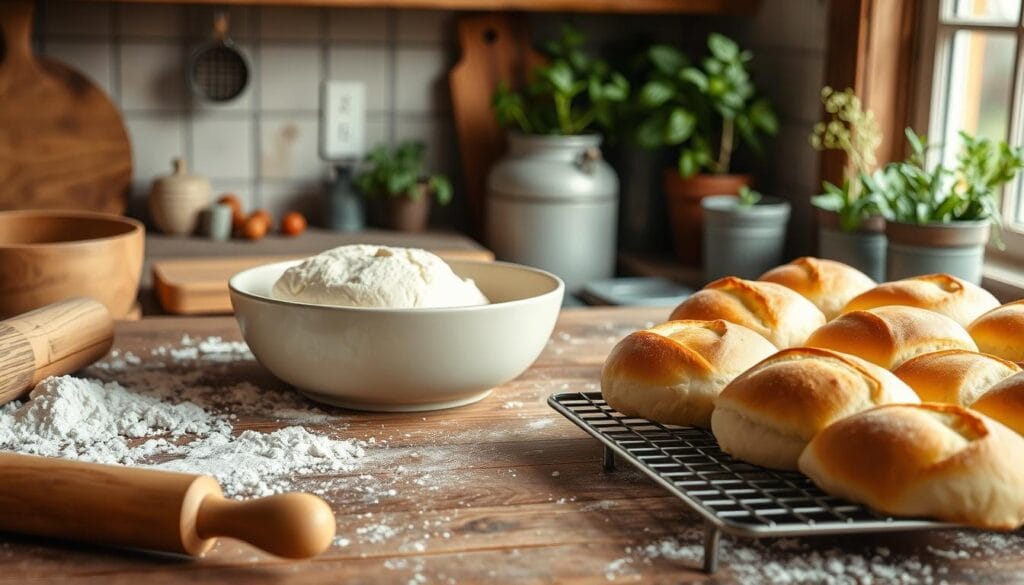
Tips for Perfect Sourdough Rolls
Baking perfect easy sourdough rolls requires understanding several key factors. Temperature and avoiding common mistakes are crucial. With the right strategies, you can create delicious treats that impress everyone.
Temperature Considerations
The ideal dough temperature is about 78°F (26°C). This ensures the fermentation process works best. Warm kitchens can speed up proofing, while cold can slow it down.
To keep your dough warm, try placing it in an oven with the light on. Or near a heating source. The environment greatly affects the dough’s rise.
Common Mistakes to Avoid
Every baker faces challenges. Knowing common mistakes helps avoid them. Here are some to watch out for:
- Under-kneading the dough: Proper kneading develops gluten, giving your rolls a wonderful texture. Insufficient kneading may lead to flat rolls.
- Over-proofing: While some fermentation is desirable, too much can lead to a weakened structure. A good practice is to check your dough by doing the finger dent test; the dough should spring back slightly when poked.
- Using an inactive starter: Ensure your sourdough starter is bubbly and active before use. Feed it with 400 grams of white flour, 100 grams of whole wheat flour, and 400 grams of lukewarm water to ensure it’s at its best.
- Not adjusting water content: The hydration level can vary; you may need to add an additional 2 ¼ to 2 ¾ cups of all-purpose flour to achieve the right consistency.
By following these tips, you can improve your easy sourdough rolls. A well-prepared approach leads to delightful dinner rolls that everyone will appreciate.
| Common Mistake | Consequences | Solutions |
|---|---|---|
| Under-kneading | Flat texture | Knead until dough is elastic |
| Over-proofing | Weakened structure | Use the finger dent test |
| Inactive starter | Poor rise | Feed starter 8 hours before use |
| Incorrect water content | Inconsistent texture | Adjust flour and water ratios |
Variations of Sourdough Rolls
Exploring sourdough rolls opens up a world of possibilities. You can make unique flavors by trying different ingredients and techniques. This part looks at sweet and savory options and how different flours can change taste and texture.
Sweet vs. Savory Rolls
Easy sourdough rolls can be either sweet or savory. Sweet rolls might have honey, cinnamon, or dried fruits like raisins and cranberries. These add a sweet taste and smell that’s pleasing.
For savory rolls, you can use roasted garlic, fresh herbs, or Parmesan cheese. These add rich flavors. Adding spices can also make your easy sourdough rolls taste even better.
Use of Different Flours
Using different flours can make your easy sourdough rolls exciting. While all-purpose flour is common, trying whole wheat or rye can change the taste and texture. Whole wheat brings a nutty flavor, while rye adds depth.
Choosing different flours lets you create new recipes. It also lets you make your easy sourdough rolls just the way you like them. Remember, using a 100% hydration sourdough starter is key for the best results.
Serving Suggestions for Your Rolls
Enjoying your homemade sourdough rolls is just as fun as baking them. Here are some creative ways to serve your rolls. They can make any meal or gathering special.
Pairing with Meals
Easy sourdough rolls are great with many dishes. They go well with:
- Hearty soups for dipping.
- Stews to soak up flavors.
- Salads for a fresh taste.
- Grilled meats for a tasty sandwich.
Creating Sliders or Sandwiches
Your sourdough rolls are perfect for sliders or sandwiches. Try making:
- Mini ham sandwiches with sliced ham and mustard.
- Pimento cheese spreads for a Southern flavor.
- Ham salad for a tasty filling.
- Jams or jellies for a sweet treat.
Conclusion
homemade sourdough bread
Baking easy sourdough rolls is a rewarding experience. It’s a great way to make something wholesome for your family. With practice and patience, you’ll get good at making homemade sourdough bread. It will be soft and full of flavor.
The journey from mixing to baking takes several hours. This makes baking a special ritual. It’s a time to enjoy the process.
Using bread flour, milk, and sourdough starter, you can make fluffy rolls. Adding instant yeast cuts down preparation time. This means you can have fresh rolls in about five hours.
You can store your rolls in an airtight bag or leave them out for a crustier texture. This lets you enjoy them just the way you like.
Enjoy the baking process and try different variations as you get better. Your homemade sourdough can go with many meals or be a treat on its own. Every batch you make is not just bread. It’s a memory filled with warmth and satisfaction.
